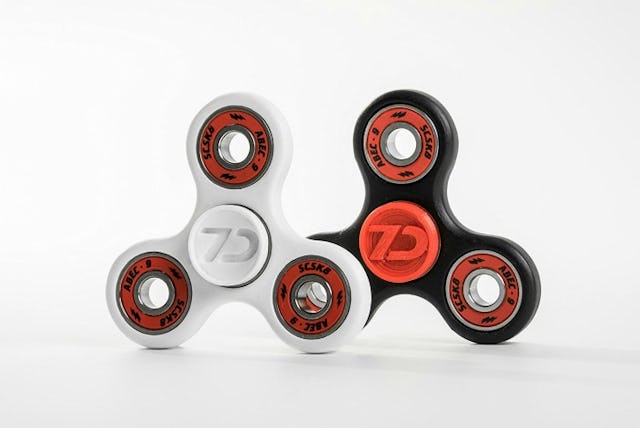Fidget Spinners Are The Latest Annoying AF Kid Trend

I’ve never been particularly on point when it comes to trends. I didn’t own any buttah-like leggings until a few months ago. I didn’t know that bottle flipping was an actual “thing” until I had screamed at my kids to knock it off or you’re going to spill water everywhere about 500 times. And I still don’t understand the appeal of Orbeez.
Most of the time, I find out about the latest trends from other parents complaining about said trends in my newsfeed. See what I mean? I find out about these fads after they’ve jumped the shark and annoyed every parent on the planet. So it’s no surprise that I first heard about fidget spinners last week after several parents mentioned them on social media, a neighbor kid played with one in the car on the way to school, and my son said he just had to have one — even though fidget spinners have been around for-freaking-ever.
So in case you’re in the dark like I am and wondering what fidget spinners are, I’m here to give you the lowdown. (Do people even say “lowdown” anymore?)
Turns out, fidget spinners aren’t really a fad at all. They’ve been used as a sensory tool for children on the autism spectrum or with anxiety, obsessive compulsive disorder, or ADHD for a while now. Like stress balls, fidget spinners give busy hands (and anxious minds) something to do so that a child can focus. And they do, pretty much, exactly what their name says — they spin. Seriously, that’s it. You hold the disc with your fingers, spin the petals, and Zen out.
I can’t explain why it works, but it does. Just trust me.
They aren’t just for kids either. Forbes recently reported on the appeal of fidget spinners for adults as well. Instead of biting your fingernails down to the quick, click-click-clicking away on your pen, or bouncing your leg up and down, you can use a fancy-shmancy fidget spinner. But unlike the $10 to 20 spinners for kids, the ones marketed to adults can cost you a couple hundred bucks.
Mental health experts have been using similar toys for years. In fact, the Slinky is one of the earliest fidget toys, according to Dr. Harris Stratyner. Who knew?! Even though fidget spinners — and similar toys — aren’t necessarily new, they have become wildly popular in recent months. In fact, the Fidget Cube, which is basically the Cadillac of fidget spinners, was the ninth-most funded project on Kickstarter, with creators raising nearly $6.5 million. Forbes even called fidget spinners 2017’s “must-have office toy for adults.”
Turns out fidget spinners have been the best kept secret — until now, that is, because apparently they are all the rage. I bought a fidget spinner on Amazon the other day to see what the buzz was all about, and if it might possibly help my older son focus. Although he’s a neurotypical child, he does have trouble concentrating and sitting still sometimes. He fidgets, moves, and bounces from one thing to the next. In fact, instead of sitting at a desk like other kids in his class, he stands at a table. So I thought I’d give the fidget spinner a try.
My son was at school when the spinner arrived so I decided to give it a whirl myself (see what I did there?), and let me tell you, there is indeed something amazing about the spinner. There’s no special trick to it — it is literally just a spinning disk — but I found it oddly addictive and wonderfully calming. The noise in my own head quieted just a little, and I felt less agitated and anxious in general.
For a hot minute, that is, because since my son got his hands on the fidget spinner, it’s been distracting as hell around here. He’s only had it six hours, and I’ve already broken up 15 fights with his brother over whose “turn” it was and threatened to take it away 97 times. He spins it at home, at the dinner table, and out in public. It might be helping him focus and calm down, but it’s driving me freaking batty.
Turns out I’m not alone in the holy-hell-can-you-just-stop-with-that-thing camp. Lots of parents and teachers are annoyed AF. The insta-popularity of fidget spinners means they’re being used as a fun toy by lots of kids who don’t actually need them for mental health reasons (like my son), and they might be causing more distraction in the classroom than they’re preventing. Parents hate them because…well, anything done incessantly can get a little annoying — whether it’s bottle flipping or foot tapping or fidget spinning.
The verdict is still out on whether the fidget spinner helps my son concentrate when he’s reading or doing homework and such, but one thing is certain: I need to get myself my own damn fidget spinner in order to calm down from the distraction my son’s fidget spinner is causing.
This article was originally published on